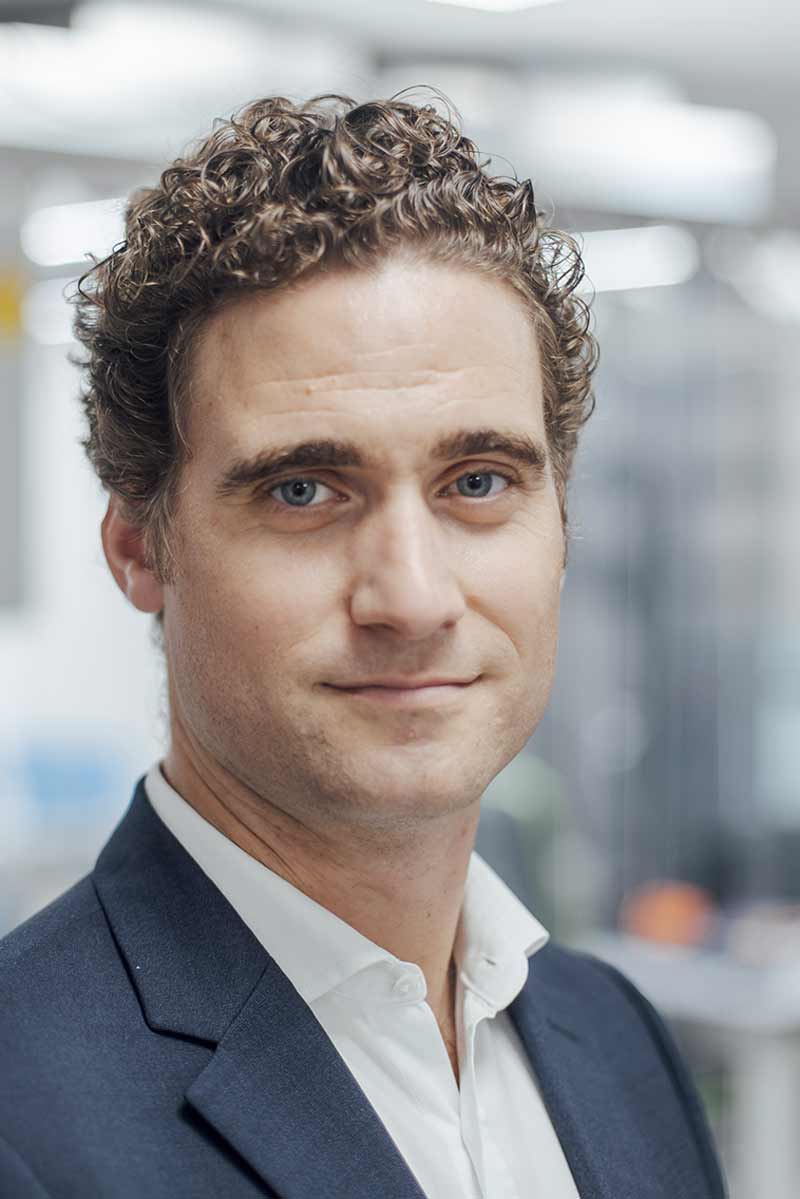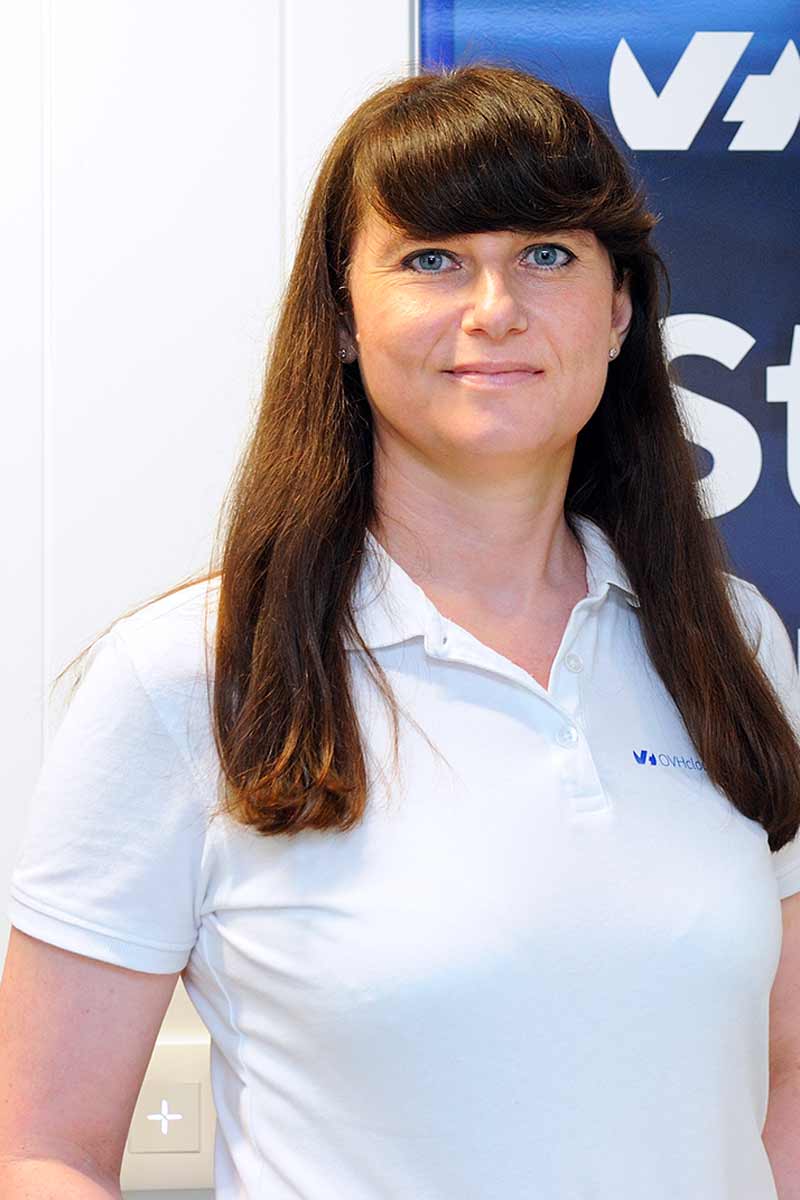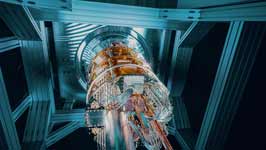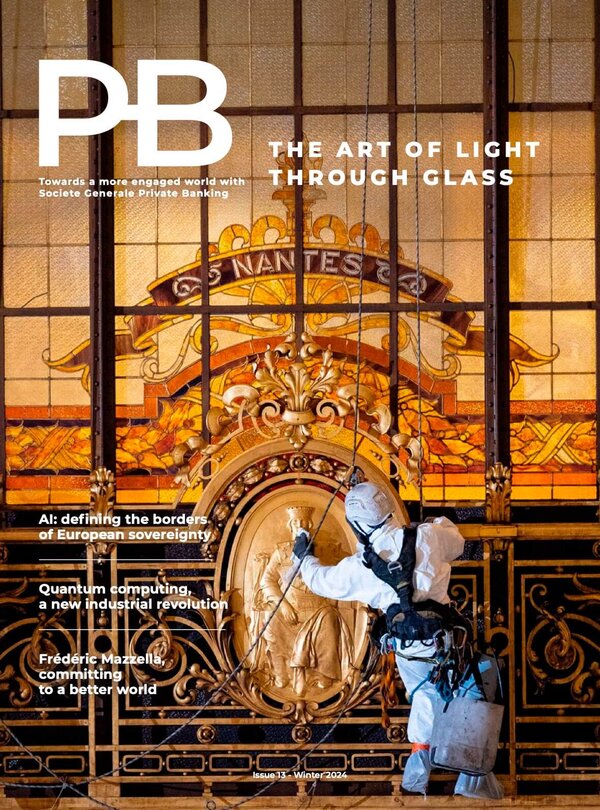
Quantum computing, a second "Big Bang" ?
The first generation of quantum computers is already in operation and ongoing developments promise unprecedented possibilities for the world of computing. This power could revolutionise many industrial sectors but also our society, in a world where the role of digital technology continues to grow.

Valerian Giesz
Co-founder and Chief Operating Officer of Quandela, a start-up designing photonic quantum computers

Fanny Bouton
Head of the Quantum programme and the start-up programme for OVHcloud, European leader in cloud services computing
Could you give us an overview of what makes a quantum computer?
Valerian Giesz: A quantum computer uses the most advanced concepts of quantum mechanics and exploits the quantum properties of matter to solve problems that a classical computer cannot handle.
The most important characteristic exploits a concept known as superposition, which is where a quantum particle (a photon or an atom for example) can occupy several states at the same time; and also entanglement, which means that the states of quantum particles, whatever the distance, can remain linked. Algorithms based on these concepts allow the computer to solve problems that are considered complex far more quickly and easily than a conventional computer.
The so-called travelling salesman problem illustrates this well. It consists of determining the shortest possible circuit between several destinations. A classical computer is quickly overwhelmed when faced with the exponential number of possible combinations that it would have to explore, one aft er the other, to find the optimal route, whereas a quantum computer is able to test all possible routes at the same time and come up with the most effective solution. We can thus better understand its potential in terms of delivering computing power.
Can we talk about a disruptive technology?
Fanny Bouton: Yes, because quantum computing will be at the forefront of the next industrial revolution, in a world where the place of digital technology grows ever larger. We see that Moore’s law1, with continuous technological improvements so far in computing and supercomputing power is finally reaching its limits. And we also know that our needs in terms of solving complex problems and data analysis will increase considerably, making this technological breakthrough a necessary one.
By making it possible to process calculations beyond the reach of classical supercomputers, quantum computing will open up an immense field of possibilities. It will be used for optimisation, simulation, security applications and, perhaps one day, for accelerating the learning of artificial intelligence. These applications are of interest to many sectors such as transport, logistics, energy, health, chemistry, materials, luxury goods, finance, cybersecurity, cryptography, and so on. Countries that master this technology will have real strategic advantages on the world stage.
V. G.: This is a technological breakthrough that will revolutionise industry and innovation, but also computing in the IT sense of the term and, more generally, our whole society. Let’s take three examples. Finance: Quantum start-ups like Quandela and others are already working with banks to find solutions for optimising financial portfolios or assessing risks.
Health: within 20 years, drugs will be developed based on simulation calculations performed by quantum computers. Finally, logistics and transport, where quantum computing will make it possible to optimise all kinds of flows and traffic. These illustrations show how this technology will reshuffle the cards across major areas of activity.
Quantum computing will be at the forefront of the next industrial revolution.

Keywords
High Performance Computing, or HPC, is made up of several tens of thousands of processors. It can perform a very large number of simultaneous computing or data processing operations, performing trillions of operations per second. Based on classical computer technology, they encode information in binary form using bits (elementary building blocks of information) which can take two possible values (states), either 0 or 1 (closed or open).
The quantum computer works with quantum bits or qubits which can take both the value 0 and the value 1 at the same time (superposition of states). This multiplication of states, associated with the fact that different qubits can also be linked together (entanglement), makes it possible to carry out calculations in parallel, opening up an immense field of possibilities. So a quantum machine of 10 qubits can simultaneously process 210 states, or 1,024 states (compared to 10 for a classic machine with 10 bits). The larger the scale of the problem to be solved, the more the quantum computer becomes exponentially more efficient than a classical computer.
The “universal”, Large Scale Quantum (or LSQ) computer would have the ability to perform any type of quantum computation and would exponentially outperform the most powerful current supercomputers for a large number of applications. These “LSQ” computers will still require many years of research before they are realised.
What stage of development are we in today?
V. G.: The current period is comparable to that of the 1950s with the first generation of computers. We are at the beginning of the story, on a huge playing field where several technological approaches are currently in competition. Many challenges remain to be overcome before large-scale industrialisation, but a first generation of quantum computers is now available, with more and more companies integrating quantum into their roadmap.
Given this context, we are now creating prototype machines and carrying out demonstrations with proofs of concept (PoC) for real use cases with partner companies such as SNCF, EDF or Thalès. Quantum computing is developing much faster than expected and is seeing continuous improvements in reliability, robustness, and computational capabilities. We rolled out our first quantum processors via the cloud in 2022 and since then, we have doubled the number of qubits in our computers. A community of more than a thousand users – students, researchers, businesses – regularly use our cloud to carry out calculations and try out new use cases.
F. B.: This familiarisation phase is crucial to prepare for future opportunities. Today’s quantum computers are providing actual, practical tools for learning quantum computing. They help familiarise people with a technology that is set to play a key role in the future. This approach led us to set up six quantum emulators: soft ware that allows us to “simulate” the operation of a quantum computer from a classical computer. Their users can conduct research and test innovative solutions, without taking the financial risk of investing in an actual machine. We certainly should not wait for the arrival of the universal quantum computer to get started! Things are moving too quickly for that. At the end of 2021, world leader IBM launched a 127-qubit processor, crossing the 100-qubit mark for the first time. And by 2030, quantum processors will have achieved significant processing power, surpassing the computing capabilities of current supercomputers.
The current period is comparable to that of the 1950s with the first generation of computers.
OVHcloud also installed its first quantum computer, MosaiQ, developed by Quandela, in its Croix datacenter facility (France) in March 2024. What are the objectives of this project?
F. B.: This investment is part of our efforts to establish a French and European quantum ecosystem. This is a signal to European industrial players to invest in these technologies in order to support Europe’s strategic autonomy. We are also promoting research within higher education and research establishments.
For example, as part of a partnership with the QuanTEdu-France consortium2, students will be able to access the quantum processor via the cloud, benefiting from hours of calculation time.
In addition, we use the computing power of this computer to develop new security techniques and test new concepts, in order to offer solutions to our customers. It is essential to support the ecosystem, working with start-ups and partners to advance these technologies, accelerate training and position ourselves in the market.
What does this step represent for you?
V. G.: When we created the start-up in 2017, we never imagined that we would be able to deliver a computer to an industrial site so quickly! We are in a new stage of our development, in an industrialisation phase with a factory inaugurated in 2023 in Massy, on the Saclay Plateau educational and technological research park. And very recently we delivered our first quantum computer across the Atlantic, to Sherbrooke in Canada. This machine is hosted by our partner Exaion, a subsidiary of EDF. And users of our cloud quantum computing demonstrators come from all over the world, proof, if any were needed, of the excitement surrounding the promise of quantum computing.
Several technologies are in competition. Why did you choose the photonics path?
V. G.: There are five major technologies, developed in parallel, to operate current machines: cold atoms, trapped ions, superconductors, electron spins in silicon and photons. All have advantages and disadvantages and it is not known, as of today, which one will prevail. We have chosen the photonic quantum computer route. In other words, we use light flux to perform calculations at the scale of the photon (the smallest unit of light energy). The characteristic of the photon is its robustness: it can be manipulated at any temperature and it does not lose information, even over long distances. A photonic quantum computer can thus perform calculations at room temperature – an advantage in terms of energy consumption – and be used in the future for a quantum Internet consisting of a global network of interconnected quantum computers.
What strengths can France and Europe deploy to establish themselves as world leaders in this field?
F. B.: France is a major actor across the spectrum of major technological challenges competing in the world. Its quantum ecosystem is dynamic, thanks to excellent research – the Nobel Prize in Physics was awarded to Alain Aspect in 2022 – a network of start-ups, some of which are leaders in their field, the support of public authorities – the State launched a French Quantum Plan (PQF) in 2021 – but also thanks to private investment funds and large private groups. Several French start-ups have raised significant amounts of money and are in direct and credible competition with American giants such as IBM, Google and Microsoft. France is certainly at the forefront as a European leader in quantum technology. However, even if the European Union, France and other European countries mobilise, they will find it difficult to compete with the United States and China in terms of investment levels. French and European companies need to accelerate their investments in quantum computing and support the development of start-ups. This is a major challenge to maintain our technologies and stay in the race. Building a strong ecosystem is a question of establishing and maintaining European independence.
V. G.: The French ecosystem was established early enough that it is now one of the best in the world. The support of public authorities is crucial for French and European players to maintain their technological lead. The Ministry of Defence launched the Proqcima programme in March 2024 and signed framework agreements with French start-ups to acquire two prototype universal quantum computers by 2032. We were also selected by the European Commission in September 2024 to deliver the first quantum computers to European computing centres. In the private sector, companies are still having some difficulty projecting themselves into an emerging technology, which will already be mature in only 5 to 10 years. However, to be operational in quantum computing by 2030, we must be proactive now, in particular to train the necessary talents and to establish new computation techniques.
What about the universal quantum computer?
V. G.: The universal, Large Scale Quantum Computer, is seen as the Holy Grail of the sector! In reality, universal or not, the quantum computer will not replace the classical computer in the near future. The two will be complementary, with a hybrid processor model that will solve more and more problems together. These hybrid machines will integrate current solutions and the quantum solutions that are currently being developed for new use cases.
Look further

A REVIEW
“Quantum, a second revolution in the making”
Polytechnique Insights No. 5, October 2023

TWO REPORTS
Can Europe Catch Up with the US (and China) in Quantum Computing?
Boston Consulting Group, 2022
A DOCUMENTARY
Does quantum change our reality?
42 – The Answer to Almost Everything, ARTE Scientific Documentary Series, 2024
Today is already tomorrow

Could Europe be the world’s “quantum valley”?
In the race for quantum technology, the European Union is not shy of showing its ambition. The 26 signatory states of the EU Declaration on Quantum Computing of December 2023 committed to developing a European quantum ecosystem. Objective: to make Europe the world’s “quantum valley”.
European cooperation kicked off with Flashy Quantique. Launched in 2018, this initiative worth 1 billion euros over 10 years is financing several research projects. Its long-term vision is to develop a quantum internet in Europe.
https://digital-strategy.ec.europa.eu/en/policies/quantum-technologies-flagship

Quantum Supremacy
What if the quantum supremacy was just around the corner? In a study by US quantum computer manufacturer QuEra Computing, 38% of respondents believe that such computers could be superior to classical computing in certain tasks within 5 years. The same proportion believes that this quantum advantage will be achieved in between 6 and 10 years and 51% of respondents note that developments in this technology are faster than they anticipated.
https://www.quera.com/blog-posts/current-and-future-state-of-quantum-computing

An IBM quantum datacenter in Germany
IBM inaugurated its second quantum datacenter in the world in Ehningen (Germany) on the 1st October 2024. The first one opened in 2019, in Poughkeepsie, New York. With this new installation and via its dedicated platform, the IBM Quantum Platform, the American group wants to make quantum technology widely accessible to scientists and businesses, to promote advances in fundamental research but also in industrial innovation.

Interview by
Catherine Veglio
Editorial adviser, journalist, novelist,
Catherine Véglio explores the fields of economy,
innovation, science, technology and their relationships with society.
1. In 1965, Gordon E. Moore (one of the three founders of Intel) conceived of “Moore’s Law”, namely that the density of transistors (number of transistors per unit area) – from which the computing power of classical computers derives – could double every two years.
2. This consortium brings together 21 French universities and major schools.






